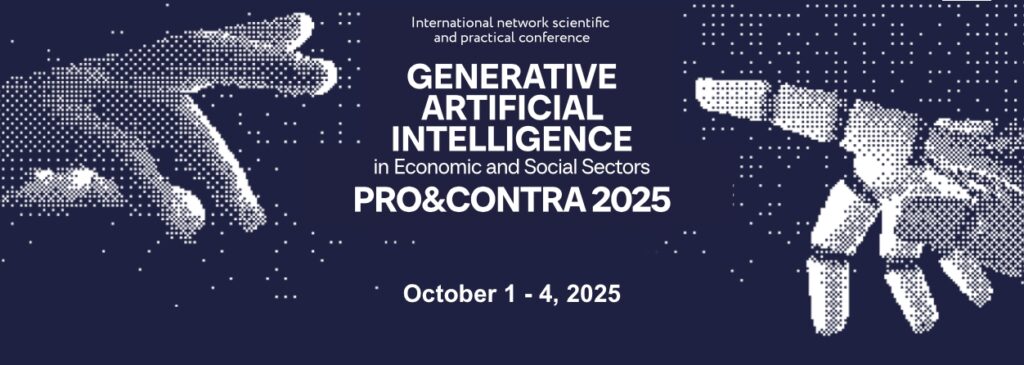THE PURPOSE OF THE CONFERENCE
Identification of prospects for the use of generative artificial intelligence in various fields and the risks that arise, discussion of areas and mechanisms for improving regulation, ensuring the safety of the use of generative artificial intelligence, familiarization with the experience of foreign countries on the use of generative artificial intelligence and its regulation.
THESIS
All registered conference participants with the report at the section meetings must send their abstracts to a single email address by September 12, 2025. GAI@spa.msu.ru.
SECTIONS
1. Generative artificial intelligence in science
October 2, 2025, 10:00 AM — 2:00 PM
Venue: VINITI RAS, Moscow, 20 Usievich Street, Large Conference Hall of the Academic Council.
Section Moderators:
- Sergey Vladimirovich Garbuk
Cand.Sc. (Eng.), Acting Director of VINITI RAS, Chairman of Technical Committee for Standardization TC 164 Artificial Intelligence
- Yuri Yurievich Petrushin
Dr.Sc. (Phil.), Associate Dean for E-Education and Digitalization of the Research and Educational Process, Head of the Department of Mathematical Methods and Information Technologies in Management, School of Public Administration, Lomonosov Moscow State University; Head of the Knowledge Management Section of the Scientific Council on Artificial Intelligence Methodology and Cognitive Research under the Presidium of RAS.
Discussion:
- Generative AI in fundamental and applied science at all stages of the research cycle
- Application of GenAI for analytics and forecasting, identifying implicit patterns, trend formation, and hypothesis generation in research activities
- Analysis and interpretation of complex data, modeling and simulation of complex natural processes using GenAI
- Intelligent decision-making support technologies
- Presentation of new knowledge using machine learning models
- Fuzzy search and data ranking, intelligent normalization, semantic and structural unification
- Regulation of GenAI application in science
2. Generative ai in education
October 4, 2025, 11:00 AM
Venue: Faculty of Pedagogical Education (Moscow, Leninskie Gory str., 1, building 52, Great Hall P-12)
Section Moderators: On clarification
Discussion:
- Current trends and approaches to the development of strategies and models for the use of GAI technologies in the system of continuing education
- Features of the creation of projects, methods and technologies for the implementation of the value foundations of Russian education using GAI
- Ways and conditions of interdisciplinary and multi-subject approaches to the use of GAI technologies in the development of digital innovative products that contribute to improving the quality of education through the use of generative artificial intelligence technologies
- The use of domestic digital tools of generative artificial intelligence in education
- Experience of using generative artificial intelligence technologies in the educational process of higher education, general education schools and the system of additional education
- Features of the introduction of artificial intelligence technologies into the education system
3. Cybernetic ai in economics
October 1, 2025, 15:00
Venue: School of Public Administration, Lomonosov Moscow State University, Moscow
Section Moderators:
- Elena N. Veduta
Dr. Sc. (Economics), Professor at Lomonosov Moscow State University, Head of the Department of Strategic Planning and Economic Policy
- Rifat I. Khabibullin
Ph.D. (Economics), Researcher at the Central Economics and Mathematics Institute (CEMI) of Russian Academy of Sciences
Discussion:
- Cybernetic principles for AI development in industries and economic sectors
- Predictive and cybernetic AI applications in economic management
- Economic-mathematical models in AI
- Digital twins in economics
- Big Data requirements for economic governance
- Gosplan (the State plan) 2.0 and Cybernetic AI
4. Generative artificial intelligence in law and it’s regulatory legal framework
October 3, 2025, 10:00 AM
Venue: School of Public Administration, Lomonosov Moscow State University, Moscow
Section Moderators:
- Svetlana S. Popova
Ph.D. in Law, Associate Professor, Deputy Head of the Department of Legal Foundations of Public Administration, School of Public Administration, Lomonosov Moscow State University (MSU)
- Yulia S. Kharitonova
Doctor of Law, Professor, Professor at the Department of Business Law, Faculty of Law, Lomonosov Moscow State University (MSU)
Discussion:
- Legal Issues in Regulating Generative Artificial Intelligence: Defining the Scope of Regulation and the Diversity of Approaches
- Generative Artificial Intelligence in Lawmaking
- Generative Artificial Intelligence in Judicial Activities
- Risks of Using Generative Artificial Intelligence in the Legal Field
- The Future of Generative AI Regulation: Scenarios for Regulation and Ensuring a Balance Between Innovation and Safety in the Development and Use of Artificial Intelligence
- International Practice and Cooperation in Regulating the Development and Use of Generative Artificial Intelligence in the Legal Domain
5. Ethics and values of generative artificial intelligence
October 1, 2025, 15.00- 18.30, room 313
October 2, 2025, 15.00−18.30, room 415
Venue: Institute of Philosophy, Russian Academy of Sciences, Moscow, Goncharnaya St., 12, p. 1
Section Moderators:
- Petrunin Yuri Yuryevich
D.Sc. (Philos.), Prof., Head of the Department of Mathematical Methods and Information Technologies in Management, School of Public Administration, Lomonosov Moscow State University; Head of the «Knowledge Management» section, SCAI&CRM RAS
- Alekseeva Irina Yuryevna
D.Sc. (Philos.), Docent, Leading Researcher, Sector of Philosophical Problems of Social sciences and Humanities, Institute of Philosophy, Russian Academy of Sciences
Discussion:
- ChatGPT and similar: a useful tool or a trap for humans?
- Responsibility of the developer and responsibility of the user beyond legislative regulation
- Ethics of human-machine communication. Understanding, imitation of understanding and problems of ethics of both parties
- «Deep fakes» — a new challenge to morality or «good old» cheating?
- Why should generative AI write articles and increase the «uniqueness» of the text? How to combat the corrosion of the ethos of education and science?
- Are classical AI values relevant to generative AI?
- Simulating ethical reflection in Generative AI (GPT first person: «As an AI, I am programmed to be ethical and guided by principles that include respect, objectivity, and support for users»)
6. AI agents
Date on clarification
Venue: Tomsk, National Research Tomsk State University
Section Moderators:
- Vyacheslav Leonidovich Goiko
Director General of the University Consortium of Big Data Researchers Association
Discussion:
- Technological foundations for creating AI agents: large language models, reinforcement learning, multi-agent systems
- Applied aspects of AI agents: from personal assistants to industrial control systems and scientific research
- Human-AI agent interaction: interfaces, trust, collaboration, and control
- Ethical dilemmas and accountability in the use of autonomous AI agents
- Security, reliability, and predictability of AI agent behavior
- Prospects for the development of AI agents and their impact on society, the economy, and daily life
- Approaches to regulation and standardization in AI agent development and deployment
7. Generative artificial intelligence and the labor market
Date on clarification
Venue: Ufa, Ufa University of Science and Technology, 32 Zaki Validi Street
Section Moderators:
- Guzel R. Baymurzina
Ph.D. in Economics, Chief Specialist at the Research Laboratory for Social and Demographic Studies, Ufa University of Science and Technology; Head of the Laboratory for Regional Studies of Quality of Life, Institute of Sociology, Federal Research Sociological Center of the Russian Academy of Sciences
- Andrey V. Popov
Ph.D. in Economics, Senior Research Fellow, Vologda Research Center of the Russian Academy of Sciences
Discussion:
- The Impact of Artificial Intelligence on Labor Market Conditions
- Changes in Employment Structure: Disappearance and Emergence of New Job Types, Evolving Demands for Skills and Competencies
- Integration of Generative AI into Work Processes: Changes in Job Content and Working Conditions
- The Impact of Generative AI on Social Relations Between Employees and Employers, and the Development of Non-Standard Forms of Employment
- Issues of Social Inequality and Worker Protection Amid the Challenges of the Digital Economy
- Directions for Improving Labor Market and Employment Policy in the Era of Artificial Intelligence
- Monitoring of Socio-Economic and Socio-Labor Processes Using GAI Technologies (i.e. Through the Analysis of Social Media, Open Statistical Data, etc., Posted on the Internet)
- The Use of GAI in Identifying Technological Trends, Forecasting and Modeling Scenarios for The Development of The Labor Market
- The Use of GAI for the Collection, Processing, Analysis and Visualization of Big Data Characterizing Social and Labor Processes
- Expansion of Research Opportunities Due to New tools, Processing Power, Application of Methods From Other Disciplines, Access to New Data Sources (Social Media, GLONASS, Electronic Receipts, etc.) and other GAI Capabilities
8. The application of AI technologies and systems in the formation of industry 5.0
October 3, 2025, 10:00 AM
Venue: National Research University «Moscow Institute of Physics and Technology» (MIPT),
9 Institutskiy Lane, Dolgoprudny, Moscow Region, Russia
Section Moderators:
- Alexander I. Kashirin
Deputy Chairman of the Scientific and Technical Council, State Corporation “Rostec”
Discussion:
- Use of AI in Applied Research
- AI-Powered Decision Support Technologies for Modernizing and Producing New Industrial Products, Including Through Analytics and Forecasting
- Analysis and Interpretation of Complex Data, Modeling and Simulation of Complex Processes Using AI for the Development of Mathematical Models and Digital Twins of Industrial Products
- Application of AI in Management and Production Processes in Industry, Including the Development of Robotic Systems
- Regulatory Aspects of AI Implementation in Industrial Production
PUBLICATIONS
Abstracts of reports included in the conference section programs will be published in the Proceedings of the conference and posted in the Russian Science Citation Index (RSCI) database.
The best reports selected by the program committees of the sections will be recommended for publication in specialized scientific journals – information partners of the conference

